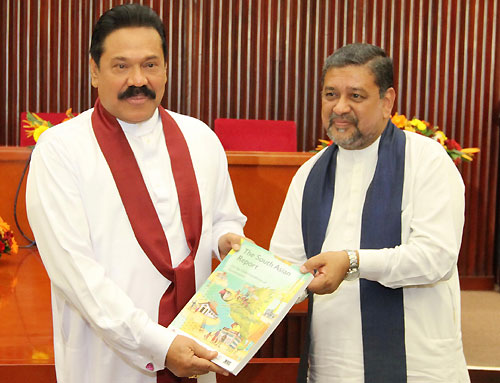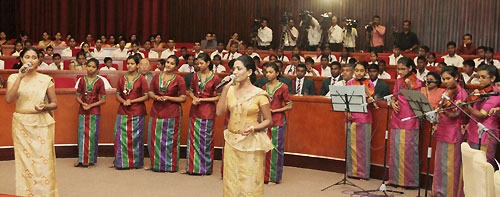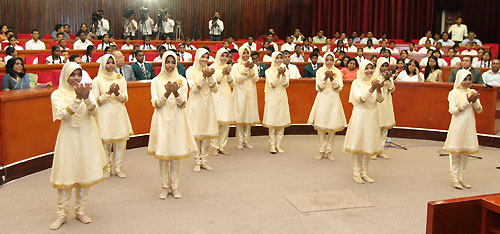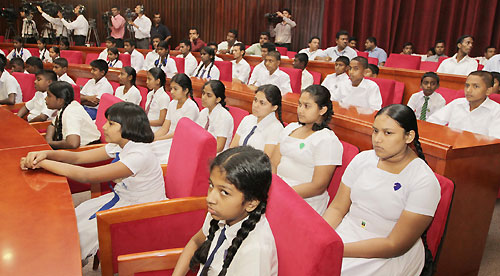|
Sri Lanka: Most child friendly government in the South Asia
By Janaka Alahapperuma Nov 18, 2013 | |
|
Sri Lanka has identified as the most child-friendly government in the South Asian region, according to a new groundbreaking report which measures the child-friendliness of the South Asian governments. This fact has been revealed by the South Asian Report on the Child-Friendliness of Governments compiled by the South Asia Initiative to End Violence Against Children (SAIEVAC) with the help of “Save the Children” and other stake holders, according to a study carried out during the past few years.
The Report evaluates efforts undertaken by countries towards fulfilling the obligations of the Convention on the Rights of the Child. It is a new comprehensive rights-based report which, for the first time, objectively measures the extent to which the South Asian governments and non-state actors have contributed to the creation of child-friendly societies. In the overall ranking of child-friendliness of South Asian governments, Sri Lanka has been ranked number one, followed by Maldives, Bhutan, India, Nepal, Bangladesh, Pakistan and Afghanistan. The report finds that, regionally, India has done the most towards establishing an enabling legal and policy framework for children, closely followed by Nepal, Bangladesh and Sri Lanka. At the same time, Maldives, Bhutan and Sri Lanka have scored very well on health, education and child protection outcomes. Overall, Sri Lanka has obtained the highest index score. Child Development and Women’s Affairs Minister Thissa Karaliyadda handed over the relevant report to President Mahinda Rajapaksa today on 17 December at a ceremony held in the BMICH in Colombo. Addressing the gathering Minister Karaliyadda said Sri Lanka becoming the most child friendly state in the South Asian region is a significant victory for the country. The government has implemented a number of programmes for the welfare of the children. Sri Lanka has made much headway in recent times in the promotion and protection of the rights of children. Out of them release of National Child Protection Policy prepared by the National Child Protection Authority is in the top place. The government has also focused special attention to prevent child abuses. He said government is ready to take every measures to protect the children of the nation. Director General of the South Asia Initiative to End Violence Against Children (SAIEVAC) Dr. Rinchen Chophel said Sri Lanka has achieved a praiseworthy service for the welfare of the Children. He offered a special memento to the President for his services rendered to Children. Eric Illayaparachchi, Secretary to the Ministry of Child Development and Women’s Affairs, Anu Juvonen, Head of Program Care and Protection, CRG-Save the Children, Anoma Dissanayake - National Coordinator (SAIVAC) and head of Child Protection Authority also spoke. Minister Sumedha Jayasena, Deputy Ministers Pandu Bandaranayake, MP Sudarshani Fernandopulle, A. L. A. M. Hisbullah, others representing both local and international organisations in the relevant sector and school children were attended the ceremony. Minister Tissa Karaliyadda is seen presenting the report to President Mahinda Rajapaksa. Pix by: Nishanka de Silva




Outline of the South Asian Report on the Child-Friendliness of Governments as follows Save the Children, HAQ: Centre for Child Rights, Plan International, Terre des Hommes, and CRY: Child Rights and You launches a new comprehensive rights-based report which, for the first time, objectively measures the extent to which the South Asian governments and non-state actors have contributed to the creation of child-friendly societies. Based upon quantitative data feeding into a composite index and complemented by detailed country-level information, the report provides key information for more focused government action and effective non-governmental advocacy to improve and change the lives of children in South Asia. The report builds on authoritative sources and has involved a large number of researchers from each country in South Asia and beyond. The South Asian Report on the Child-friendliness of Governments evaluates the efforts of the governments in Afghanistan, Bangladesh, Bhutan, India, Maldives, Nepal, Pakistan and Sri Lanka towards fulfilling the obligations of the Convention on the Rights of the Child. The report finds that, regionally, India has done the most towards establishing an enabling legal and policy framework for children, closely followed by Nepal, Bangladesh and Sri Lanka. At the same time, Maldives, Bhutan and Sri Lanka have scored very well on health, education and child protection outcomes. Overall, Sri Lanka has obtained the highest index score. It is important to note that all countries, including Afghanistan and Pakistan, have made important progress in most of the themes covered by the report. Since 2000 in particular, governments in South Asia have put in place a basic enabling framework of laws, policies and institutions for the implementation of the Convention on the Rights of the Child, and made important progress in children’s health and education. However, the countries that have done the most towards putting in place an enabling structural framework for children have not always been able to ensure as good education, health and protection outcomes as may have been expected, nor have they necessarily promoted children’s voices in decision-making at local and national levels. There is, therefore, still a need to better ensure children’s legally enforceable right to health, education and protection, and to ensure that the structural framework in place has the power to create change. Stronger mechanisms are needed to translate new laws, policies and institutions into meaningful entitlements and services for children; data collection should be used more systematically to track progress; and further collective efforts of governments, inter-governmental organisations, non-state actors, communities and children are necessary, nurturing a cadre of child rights professionals and activists. Of great importance is the inclusion of children’s issues at the highest political level in national planning, budgeting and governance. Yet South Asia is a vibrant region, with increased and fruitful interaction and synergies between governments and other child rights actors, including non-governmental organisations, children and their families. Having adopted the Convention on the Rights of the Child 20–25 years ago, the countries in the region have all taken notable steps to respect, protect and fulfil the human rights of children. Substantial progress has been achieved in, for instance, improving access to education and health services and a few countries have had remarkable success in ensuring birth registration for most children and almost eliminated child marriage. The many successes and lessons learnt present an opportunity for the South Asian governments. As such, the foundational structures have often been established for continued work to transform promises made into tangible realities for children. To make sure that this opportunity to build upon the progress is taken, the South Asian Report calls on the government in the region to take action through seven key recommendations. These include the need for governments to continuously follow up on the Concluding Observations, the Universal Periodic Review recommendations and the General Comments, and undertake high-level and authoritative coordination across ministries and levels of government. Ensuring adequate and effective utilisation of private and public resources is another key recommendation. Throughout the report, children’s participation in decision-making affecting their lives is identified as a key requirement for realising children's human rights and fulfilling the promises to children. As part of the general principles of the Convention on the Rights of the Child, child participation should therefore be promoted in all law and policy formulation affecting children, as well as in practice. Link: http://resourcecentre.savethechildren.se/news/south-asian-report-child-friendliness-governments comments powered by Disqus |
|